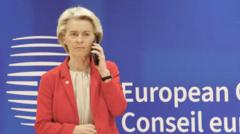The ruling marks a significant step towards greater transparency in European governance and raises questions about the handling of public information.
**Court Mandates Transparency: EU Must Release von der Leyen's Pfizer Messages**

**Court Mandates Transparency: EU Must Release von der Leyen's Pfizer Messages**
The European Commission's denial to publish key text messages is deemed unlawful by the EU's General Court.
In a landmark ruling, the EU's General Court has reprimanded the European Commission for refusing to disclose text messages exchanged between Ursula von der Leyen, the Commission President, and Pfizer's CEO, Albert Bourla, amid Covid-19 vaccine negotiations. The decision asserts that the Commission failed to provide adequate justification for withholding these communications, which raises serious concerns regarding transparency within the EU's operations.
The controversy surrounding the messages, which are notably linked to a multimillion-euro vaccine deal signed by Pfizer and the EU, has been dubbed "Pfizergate" and highlights the intricate balance of power between public officials and private pharmaceutical companies during the pandemic. Anti-corruption advocates, such as Transparency International, have praised the ruling, asserting it emphasizes the need for a paradigm shift towards a more transparent EU political landscape.
Ursula von der Leyen, who assumed her role in 2019, has been navigating the treacherous waters of the pandemic response since her first year in office. Despite her re-election to a second term, this judgment potentially jeopardizes her reputation due to the opaque nature of her negotiations regarding the vaccine, which involved substantial financial commitments from the EU.
The original request to access the text messages was initiated in 2021 by Alexander Fanta, an investigative journalist, following a New York Times report disclosing von der Leyen's behind-the-scenes discussions with Bourla. Upon the European Commission's refusal to comply with the request, citing the absence of such documents, Fanta escalated the matter to the European Ombudsman. Their investigation concluded that the Commission's negligence in searching for these text messages constituted maladministration.
Noteworthy is the Commission's argument that text messages do not constitute public documents, leaving their archival status ambiguous. However, the court firmly counters this notion, asserting that the burden of proof now lies with the Commission, which must demonstrate either the non-existence of these records or the circumstances surrounding their potential deletion.
The ruling is expected to raise critical questions about the European Commission's archiving practices, particularly regarding informal communications made over personal devices. As the Commission considers its subsequent steps, it faces increasing pressure to uphold transparency standards demanded by EU citizens and stakeholders worldwide.
The controversy surrounding the messages, which are notably linked to a multimillion-euro vaccine deal signed by Pfizer and the EU, has been dubbed "Pfizergate" and highlights the intricate balance of power between public officials and private pharmaceutical companies during the pandemic. Anti-corruption advocates, such as Transparency International, have praised the ruling, asserting it emphasizes the need for a paradigm shift towards a more transparent EU political landscape.
Ursula von der Leyen, who assumed her role in 2019, has been navigating the treacherous waters of the pandemic response since her first year in office. Despite her re-election to a second term, this judgment potentially jeopardizes her reputation due to the opaque nature of her negotiations regarding the vaccine, which involved substantial financial commitments from the EU.
The original request to access the text messages was initiated in 2021 by Alexander Fanta, an investigative journalist, following a New York Times report disclosing von der Leyen's behind-the-scenes discussions with Bourla. Upon the European Commission's refusal to comply with the request, citing the absence of such documents, Fanta escalated the matter to the European Ombudsman. Their investigation concluded that the Commission's negligence in searching for these text messages constituted maladministration.
Noteworthy is the Commission's argument that text messages do not constitute public documents, leaving their archival status ambiguous. However, the court firmly counters this notion, asserting that the burden of proof now lies with the Commission, which must demonstrate either the non-existence of these records or the circumstances surrounding their potential deletion.
The ruling is expected to raise critical questions about the European Commission's archiving practices, particularly regarding informal communications made over personal devices. As the Commission considers its subsequent steps, it faces increasing pressure to uphold transparency standards demanded by EU citizens and stakeholders worldwide.



















